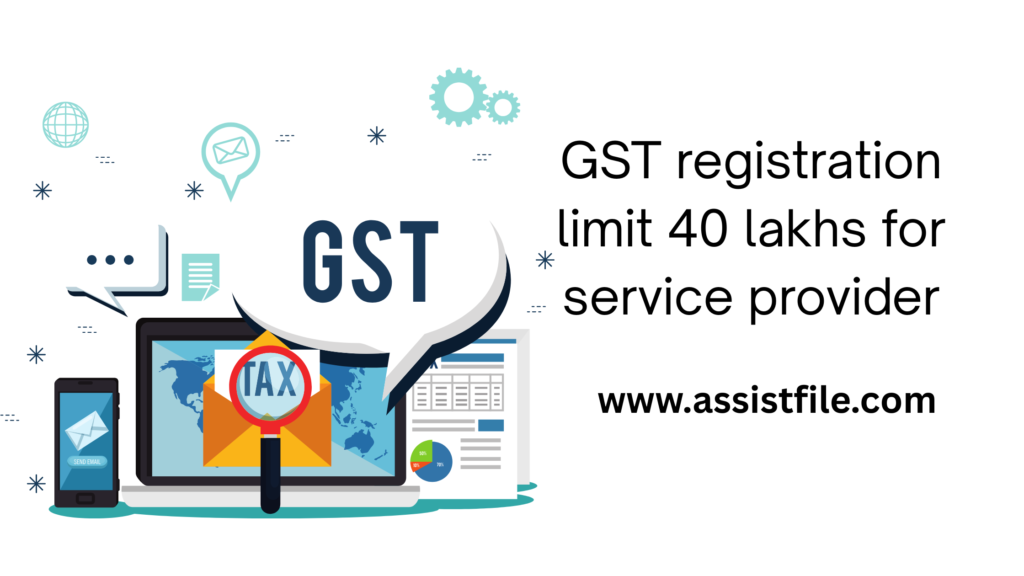The Goods and Services Tax (GST) has significantly altered the indirect taxation environment in India. Despite its simplicity and universality, the GST registration thresholds continue to cause considerable uncertainty, particularly for service businesses.

One such widespread misconception concerns the exemption ceiling of ₹40 lakh. Many service providers believe that until their turnover reaches ₹40 lakhs, they are exempt from GST registration. That isn’t true, though.
In this blog, we’ll explain the current criteria, whether the ₹40 lakh cap applies to service providers, and how to maximize your exemptions while being compliant.
What Is GST Registration?
Businesses and individuals whose total revenue surpasses a specific threshold are required to register for GST. They are able to claim input tax credits on purchases and collect taxes from customers, thanks to this registration.
India’s GST law divides taxpayers into two primary groups:
- Suppliers of goods
- Service suppliers
Depending on the kind of supply and the state or union territory where the company works, each of these categories has a distinct threshold limit.
The ₹40 Lakh GST Registration Limit: A Common Misconception
Only goods suppliers are subject to the ₹40 lakh GST registration requirement; service providers are not.
Who Is Eligible for the ₹40 Lakh Cap?
Only intrastate suppliers of commodities (not services) are eligible for the ₹40 lakh barrier, and even then, not all states offer it. The cap applies to vendors who:
- Provide intrastate supplies or sell items within the same state.
- Work in states that have chosen to implement this higher cap.
- are not involved in interstate or online sales
Who Is Not Entitled to the ₹40 Lakh Cap?
The ₹40 lakh exemption limit does not apply to the following groups:
- Service providers (such as marketing firms, consultants, and independent contractors)
- Suppliers engaged in interstate commerce
- Companies that use e-commerce platforms to sell
- Companies based in certain states that fall under a unique category
So, what is the GST registration limit for service providers?
For service providers, the GST registration threshold is ₹20 lakhs of aggregate turnover in a financial year.
However, this limit is reduced to ₹10 lakhs for businesses operating in special category states like
- Mizoram
- Tripura
- Manipur
- Nagaland
- Arunachal Pradesh
- Meghalaya
- Sikkim
- Uttarakhand
Who Is Considered a Service Provider?
If your business primarily delivers intangible value—consulting, education, digital marketing, freelancing, design, software, legal, healthcare, etc.—then you fall under the service provider category under GST.
Even online coaching classes, app developers, social media marketers, and content writers are considered service providers and must register once they hit the ₹20 lakh turnover mark.
How to Calculate Aggregate Turnover?
The following are included in aggregate turnover:
Taxable supplies (except from inbound supplies, which are subject to reverse charge tax)
- Exempt supplies
- Exports
- Supplies from other states
Since it is computed on an all-India basis, the overall turnover is taken into consideration even if you have several branches in various states.
Example Scenario
Consider that you are a freelance graphic designer in Delhi.
Your entire income (both domestic and overseas) for FY 2024–2025 is ₹19.5 lakhs.
You solely offer design services; you don’t sell products.
You don’t sell on online marketplaces or e-commerce portals.
Since your turnover hasn’t surpassed the ₹20 lakh threshold, you are exempt from registering under GST in this instance.
Let’s now assume that your turnover is ₹22 lakhs for the upcoming fiscal year. Even if you just service customers in Delhi, GST registration then becomes required.
What Happens If You Don’t Register?
Failure to register under GST after crossing the threshold can lead to:
- Penalties of ₹10,000 or the amount of tax evaded, whichever is higher
- Ineligibility to collect GST from clients
- Loss of input tax credit benefits
Worse, if you’re working with corporate clients, they may refuse to pay invoices without a GST number, reducing your credibility and business opportunities.
Voluntary Registration for Service Providers
You have the option to voluntarily register for GST even if your turnover is below the threshold. Among the advantages are
Claiming your business purchases’ Input Tax Credit (ITC)
- Increased compliance and trust with larger clients
- Qualifications for Government Contract Bidding
- Credibility and professional branding
You must, however, fulfill all GST filing and payment requirements after voluntarily registering, regardless of whether you eventually surpass the ₹20 lakh level.
Documents Required for GST Registration (For Service Providers)
- PAN card of the business or proprietor
- Aadhar card
- Business address proof (electricity bill/rent agreement)
- Bank statement or cancelled cheque
- Digital signature (DSC) (for companies or LLPs)
- Passport-sized photograph
- Authorization letter or board resolution (for businesses other than proprietorships)
Recent Updates and Amendments
The GST registration threshold for service providers remains unchanged as of April 2025. The ₹20 lakh cap is still in place, but you should always watch for any changes during GST Council meetings or Union Budget announcements.
Key Takeaways
| Topic | Summary |
|---|
| ₹40 Lakh Limit | Only for goods suppliers (not service providers) |
| GST Limit for Services | ₹20 lakhs (₹10 lakhs in special category states) |
| Voluntary Registration | Allowed and sometimes beneficial |
| Risk of Non-Compliance | Penalties, loss of credibility, and legal issues |
| Current Rule | No ₹40 lakh limit for service providers |
Conclusion:
Avoid making the mistake of presuming that the ₹40 lakh GST limit applies to you if you are a service provider. Once you surpass the correct threshold of ₹20 lakhs (or ₹10 lakhs in particular states), you must register for GST.
Running your firm efficiently and avoiding fines depend on your ability to understand your responsibilities. Use an online GST registration provider or speak with a qualified GST expert if you have questions or need assistance with your GST compliance.